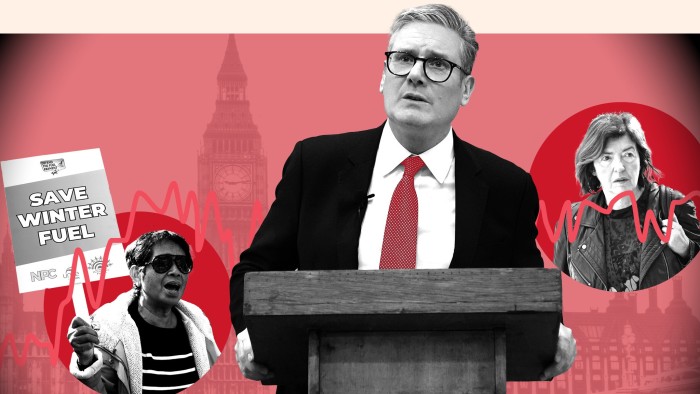Sir Keir Starmer’s friends say the prime minister needs a holiday. After a year of electoral triumph followed by a precipitous drop in support — with no time off in between — the UK Labour party’s high command appears exhausted.
“He needs a break, they all need a break,” said one confidant. “These are people who haven’t had a holiday for a year. They are crawling to the finishing line.” The big question facing Starmer is whether he can return refreshed from an overseas new year’s break and revive his ailing administration.
The Financial Times has spoken to ministers, aides, business leaders and Labour MPs — most speaking anonymously — to piece together what went wrong for Starmer after his landslide election victory on July 4 and whether the prime minister can turn things around.
His ambition to lead a “government of service” has been disrupted by a nearly constant stream of distractions or blunders: the summer riots, the clothing donations scandal, Sue Gray’s departure, the fallout from the Budget.
“He’s really frustrated about the way the first few months went,” said one Downing Street insider. “Not just the waste of time but the waste of political capital.”
Publicly, Starmer is defiant. Asked by the House of Commons liaison committee last week if he would have done anything differently, the prime minister said: “No.” He reeled off reforms to planning, pensions and railway nationalisation among his government’s achievements.
Yet no prime minister in recent times has seen such a calamitous fall in public support in such a short space of time. Some Labour MPs have started discussing who might replace Starmer and lead Labour into the next election.
There is now widespread agreement in Number 10 and the Treasury that the £1.5bn cut in winter fuel payments for 10mn pensioners in late July was a major political mistake, which sowed the seeds for many of the government’s later problems.
“We should have asked more questions,” admitted one official involved in the decision, referring to the belief that chancellor Rachel Reeves had been too ready to pick up a cost-saving idea that had long been promoted by the Treasury.
The decision fuelled a sense around Starmer’s new government that Labour would be little different than the Conservatives, who had just been evicted after 14 years in power. Starmer’s acceptance of £32,000 of freebie suits and glasses added to that narrative.
John McTernan, a former Labour Downing Street aide, said: “Cutting winter fuel payments was an egregious error because it was done out of context, in the long, four-month gap between election and Budget. It had a fundamental impact on fixing a perception of this government.”
Reeves hailed the winter fuel payment cut as evidence of the need to take “tough decisions” to tackle what she claimed was “the worst economic inheritance of any government since the second world war”.
Senior Labour figures admit the downbeat message was overdone, contributing to a loss of business confidence. “We’ve been too gloomy,” said one cabinet minister. “We may have done the right thing but we’ve lacked a story to explain why we’re doing these things.”
Ministers admit the party was also ill prepared for government. “Access talks before the election didn’t start early enough,” said one minister, referring to the discussions that take place between opposition politicians and the civil service to prepare a plan for government.
Gray, Starmer’s former chief of staff, is widely blamed in Starmer’s circles for the lack of preparedness, not just in terms of policy but personnel. “The whole process of appointing ministers was a shambles,” said one minister.
Gray was ultimately forced out of her job by Starmer in October, shortly after the prime minister returned from a Labour conference in Liverpool that felt more like a wake than a victory party.
“After conference, Keir was determined to change things,” said one Labour official. “People were just in a state of shock. There was the shock of being in government, then the riots, then the party conference. It wasn’t all Sue’s fault.”
Then came Reeves’ Budget on October 30, an event that caused a huge rift with a business community that had been assiduously courted by Labour before the election. Economic stagnation and falling business confidence have followed.
The sense of betrayal caused by Reeves’ £25bn national insurance increase on employers was huge, but it also had a knock-on effect on the economy. Surveys measuring manufacturing confidence and hiring plans fell sharply; the economy flatlined.
“She’s just not up to the job,” said one FTSE 100 boss. “The collapse in confidence in the business world has been catastrophic. I think it is overdone, but it has happened.”
The cumulative effect of all these setbacks has been to erode morale at the centre of Starmer’s administration. “There is a slight confidence issue,” admitted one person who works closely with Starmer.
An attempted December relaunch saw Starmer set out six policy “milestones” to focus his government’s energy and resources, but he generated more headlines with his claim that some civil servants were “comfortable in the tepid bath of managed decline”.
“I can’t understand where that came from,” said one minister. “I’d have been upset.” Starmer subsequently had to write to furious civil servants to try to calm the row.
Starmer’s backers believe he can turn things around in 2025. Tom Baldwin, the prime minister’s biographer, said that “in every big job he has done, he has had quite a rocky start,” referring to awkward beginnings in his role as Labour leader and as director of public prosecutions.
“He tries different things until he finds something that works,” Baldwin said. “It’s not flashy or inspiring, but it’s probably not just the best way to dig yourself out of a hole, but also the best way to run the country.”
Starmer’s top team is finally taking shape, with veterans of the Tony Blair era being brought back into the centre. Jonathan Powell and Liz Lloyd, stalwarts of the Blair Downing Street operation, are being brought back in to reprise their roles in foreign policy and domestic reform, respectively. Lord Peter Mandelson, New Labour veteran, will take on the key role as US ambassador.
Pat McFadden, Cabinet Office minister and former Blair fixer, and Lord Spencer Livermore, a veteran adviser to Gordon Brown, regularly meet Morgan McSweeney, Starmer’s chief of staff, to plot strategy and defuse political rows. The media team has been strengthened.
Starmer’s allies say he will “roll up his sleeves” and get on with the job, although any deterioration in the economic outlook — or damaging fallout from US president-elect Donald Trump’s trade policy — could force Reeves to return later in 2025 for more politically damaging tax rises.
There is some optimism in the Starmer camp that Kemi Badenoch, Tory leader, has not yet turned out to be the political threat they initially feared. One Downing Street insider said: “He was worried about how things would look in the House of Commons — that he might look like a white man ‘mansplaining’ to a black woman. He has handled it well.”
Starmer is, however, worried about the rise of Nigel Farage’s Reform UK, which might initially pose a threat on the right to Badenoch but that Labour strategists fear will ultimately present a serious danger to its party too. “People are super-nervous about Reform,” said one minister.
Starmer’s team say they will not make the mistake of deploying the “Pied Piper strategy” adopted by US Democrats ahead of the 2016 presidential election, when they actively talked up Trump in the hope it might destabilise the Republicans and take them down a populist rabbit hole.
Attempting to talk up Farage in the hope that he might pull Badenoch onto Reform’s populist terrain could easily backfire, according to Labour strategists: “If you do that, you might suddenly find yourself asking ‘what have we created?’,” said one. Another said: “There’s no template for the centre-left beating the populist right.”
Starmer’s team admit that the prime minister has got to roll up his sleeves and prove to voters that a mainstream centre-left government can still deliver. “He’s frustrated, everyone’s frustrated,” said one Downing Street insider. “We have to show people we are on their side.”
McTernan said the Labour government reminded him of the Eric Morecambe joke about playing “all the right notes but not . . . in the right order”, adding: “The fundamentals are right, the communications have not been as good, but that’s better than the other way around.”
Should Starmer and Reeves go into 2025 trying to inject some optimism into a political debate that has become depressed, almost fatalistic? One Labour minister seemed unsure: “I’m just not sure if Rachel and Keir are upbeat people.”










